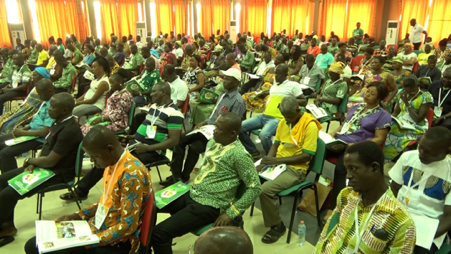The Kuapa Kokoo Cooperative Cocoa Farmers and Marketing Union Limited (KKFU) has set its target on interventions that contribute to positively impacting livelihoods of farmers under the union.
To this end, currently, Kuapa Kokoo’s resolve is deepening its diversification programme beyond on-farm to off-farm projects, according to President of KKFU, Madama Fatima Ali.
In terms of on-farm projects, she observed that the focus is on sustainable cocoa production. This comes with the cultivation of cocoa and alternative crops through scaling-up dynamic agroforestry practices. It is modelled after farmer needs assessment and client specification for project implementation.
The DAF model has already been piloted in the Sankofa project areas – Goaso, Sankore, Bibiani, Mim and Kukuom.
The project’s highest point was the payment of living income differential (LID) to farmers, and this has attracted other cooperatives within the union to call for the project to be extended to their areas.
Madama Fatima Ali said: “Our quest is therefore to work with our partners on ensuring that our farmers enjoy the fruit of their labour, while doing business in a sustainable and profitable environment with the ability to support their families”.
Addressing farmers during the 27th Annual Delegates Conference, in Kumasi, she noted that by adopting the DAF model and Climate Smart Cropping Systems (CSCS), they will achieve organic cocoa production.
“This is a positive step toward reducing the use of chemical fertiliser and continuously improving soil structure and productivity. The cumulative effect of the approach will lead to a reduced cost of production, improved climate change mitigation and increased production among others,” she stated.
Furthermore, it has also taken strategic steps that will ensure achievement of the climate-focused objectives. These include CSCS practices such as planting shade trees, cultivation of cover crops, crop diversification, encouraging Integrated Pest Management practices, and enhancing off-farm alternative livelihoods among Kuapa Kokoo farming communities.
To this end, an organic cocoa production project is being implemented at Agona and Juaben societies with support from Agronomes et Vétérinaires Sans Frontières (AVSF).
It is expected that the project will lead to organic certification which is similar to the DAF – Sankofa Project empowered by the Alliance for Action partners, whereby DAF farms will be converted and attain organic certification.
Madam Ali said the plan is to deepen diversification to increase stakeholders’ income by ensuring Kuapa farmers have a sustainable livelihood. This is by adding value to the premium cocoa produced by farmers through processing.
She envisaged this will make the union earn enough on its produce to support and pay a higher premium to its farmers.
“These bold steps highlight Kuapa Kokoo as the forerunner in terms of driving change and leading innovation in the cocoa sector,” she added.
The Executive Secretary of KKFU, Nelson Adubofour – also speaking at the side-lines of the conference, disclosed that the company intends to have a project for every society of the union to entrench cocoa certification.
This means an extra payment of premium (LID bonus) for each bag of cocoa sold for the certification compensation.
Mr. Adubofour noted that KKFU together with its key partners is pioneering the payment of LID with some pilot projects they are undertaking.
The Head of Region-Fairtrade West Africa, Edward Akapire, acknowledged that one of their major objectives is to improve farmers’ income. As such, he said, Fairtrade has since 2016 developed a LID strategy with multiple pillars to improve farmer income.
He is hopeful that doing this will help to secure dignified livelihoods for cocoa farmers.










